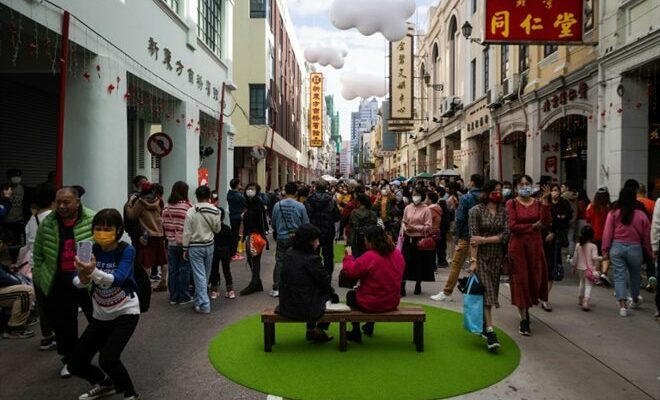A dragon dance in front of the A-Ma Temple during the celebrations of the first day of the Lunar New Year in Macau on January 22, 2023 (AFP/Eduardo Leal)
In Macau, the joy of seeing the crowded streets again for the Lunar New Year was dimmed by doubts about the future of the casinos, veritable gold mines in the sights of the Chinese authorities.
Tourists from mainland China, free of Covid zero for more than a month, swarmed the gambling city for the holidays, storming its historic sites and businesses.
Visitors may be back, but the gamblers’ eldorado cannot be content with it, as Beijing regularly urges it to diversify its economy, which depends on gambling.
However, it is difficult to imagine Macau, the only Chinese territory where casinos are legal, abandoning this sector which generates colossal tax revenues.
But the continent is not letting up the pressure. Chinese President Xi Jinping is leading an anti-corruption campaign, cracking down on gambling and money laundering.
Macau “faces an intrinsic problem,” David Green, an expert consultant in the gambling industry, told AFP.

Performers prepare for the start of the Dragon Dance during celebrations on the first day of the Chinese New Year in Macau on January 22, 2023 (AFP/Eduardo Leal)
On the one hand, its authorities must show Beijing that they promote abstaining from gambling. On the other hand, they must ensure that this source of income is maintained.
Last year, the former Portuguese colony of 700,000 inhabitants saw this flow of wealth dry up and reach its lowest level with 5.2 billion dollars generated (about 4.8 billion euros).
In question, the closure of most shops, when Macao was facing a peak in Covid contaminations.
– “Step forward” –
Only six operators share this lucrative market. Just before the pandemic, it brought in six times more than that of Las Vegas.
In December, the local government renewed concessions to operators for ten years, effectively maintaining the status quo while introducing new conditions for out-of-game investments.
Firms in the sector have since committed 14.9 billion dollars (about 13.7 billion euros) in the construction of theme or exhibition parks, gourmet restaurants and performance halls.

People enjoy their time on San Ma Lo Avenue during celebrations on the first day of the Chinese Lunar New Year in Macau on January 22, 2023 (AFP/Eduardo Leal)
According to former member of the Legislative Assembly Sulu Sou, it is a “step forward” in the diversification of Macao’s economy, much more concrete than vague slogans that have remained unimplemented for years.
“Changes in the industry and in mainland Chinese attitudes towards gambling have forced the (Macau) government to write these terms down in black and white,” he told AFP.
Mr Sou also recalls the recent downfall of “junket king” Alvin Chau, who was sentenced to 18 years in prison last week by a local court for running an illegal gambling empire.
A “junket” is an intermediary who facilitates the arrival in the casinos of Macao of the players while being used to them at the same time as tour operator and lender.
Mr. Chau was the pioneer of this industry which attracted many mainland bettors through VIP rooms and credit extensions.
“It was a major signal to society that even if we return to normality, we can no longer use the old ways to make a fortune,” said Sulu Sou.
The VIP sector accounted for 15% of industry revenue before the pandemic, but the majority of those gains would now be “lost forever” over regulatory issues, Credit Suisse analysts wrote.
– “Glory of yesteryear” –
Last month, Macau abolished most of its health restrictions and reopened its borders, following China’s lead.
For residents like Mariana Soares, a pharmacist, the reopening has put an end to three years of anxiety and economic stagnation and has had the effect of an electric shock.
“Suddenly everyone is coming and it’s like everything that happened before has been erased,” she told AFP.
Kam Pang, owner of a dance hall, will for his part cease his activity after two “mentally trying” years and losses of 25,000 dollars (23,000 euros) caused by the compulsory closure of businesses.
“We could no longer do business because suddenly we were confined” for 15 days because of the virus, he recalls.
Eager to put the Covid behind it, the city went into overdrive for the Lunar New Year, hoping to capitalize on the event to support economic momentum.
High-end hotels were fully booked and authorities noted a return of weekend travelers, about half the pre-pandemic level.
Consumer gambling revenue is expected to be 55% of its pre-Covid level by the end of the year, then 85% in 2024, according to analysts at Credit Suisse.
“Macau will recover, I just don’t know if it will regain its former glory,” wonders Ms. Soares, who plans to move to find better economic prospects.
For Kam Pang, “the question is whether people will want to come to Macau, not to bet, but to do something else there”.
© 2023 AFP
Did you like this article ? Share it with your friends with the buttons below.




